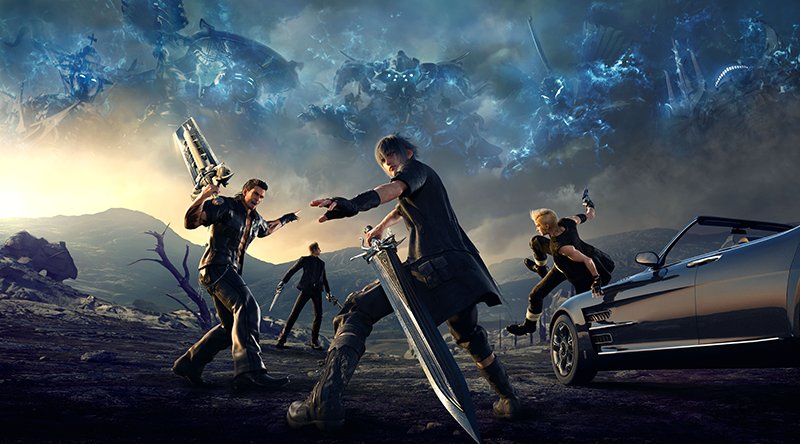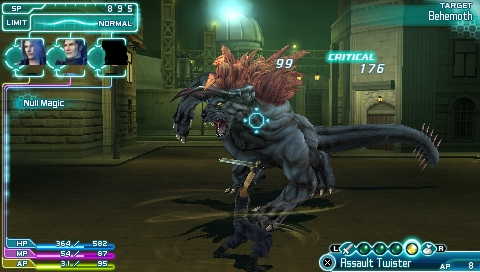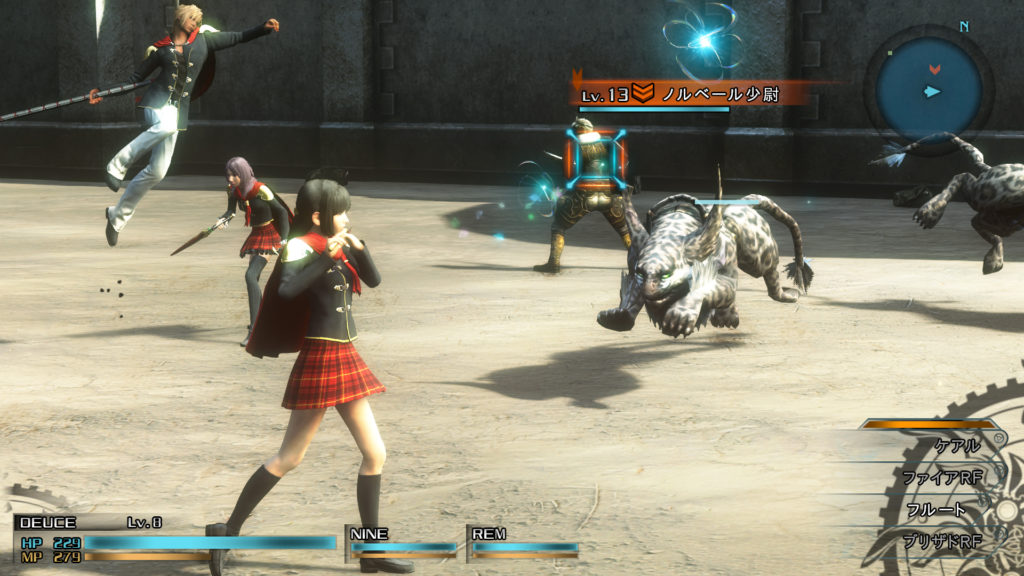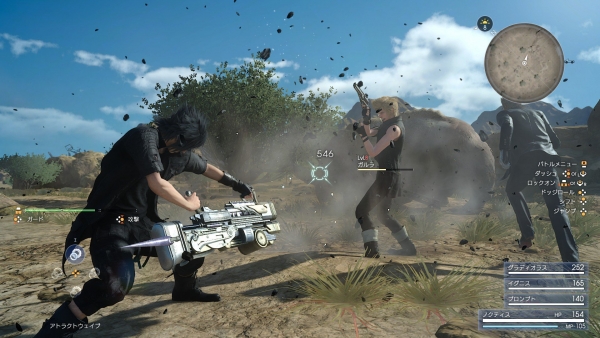13 Now may the God of hope fill you with all joy and peace in believing, so that you will abound in hope by the power of the Holy Spirit.
Romans 15

I’m worried about Final Fantasy XV. I say this as both an irrational fanboy and as a critic who, apparently, was talking about the game that would become the next entry in the main series years before it held that name. I’m honestly not sure whether Final Fantasy Versus XIII would prove to become the better game or not – that decision can no longer be made by us. A decade’s worth of development led to a change in directors from Tetsuya Nomura, in all his zipper-and-leather fetished glory, to Hajime Tabata, whose only accomplishments that I can note are “making an action RPG work on a hand held console” and “getting projects done on time”. Neither of these events bode well!
So, let’s take a look at Tabata’s previous works, at least in brief, to see where my concern derives. Crisis Core: Final Fantasy VII is a bit weird even for a spinoff game. It tells the tale of Zack, who you might know as the famous, unseen SOLDIER which Cloud emulated in Final Fantasy VII. Zack’s the exact opposite of Cloud – outgoing, lighthearted, and altogether selfless. So, what better way to expand the world of everyone’s favorite Final Fantasy game than to expand the universe? I’m sure the idea sounded great in both game design and in the massive mountains of cash it would no doubt generate. But did the game hold up?
Yes, and no. I’d say the mission structure works for a handheld game – you can play and make progress in 15-20 minute chunks, or however long it takes a Japanese businessman to get from his apartment in some suburb of Tokyo to work. But, in terms of combat fun, I’d call it functional at best. You run around, you hit things, and that’s about it. They shoehorn materia into the battle system here and there, which would be fine if something called the Digital Mind Wave system didn’t exist.

The DMW (I almost typed DMV, lol) consists of a random slot machine that pops up at random intervals during combat segments. Basically, you get random combat benefits for no apparent reason, because pretty much every combination gives you a benefit of some kind, whether it’s extra health, materia, experience points, or giant summon monsters of doom that kill everything. I never really got why they bothered to put something into the game like this, but it decides battle often enough that skill doesn’t play a factor in whether you complete a mission or not. I never really got more than a few hours into the game mostly for the above reasons – other than branding, nothing really stands out about Crisis Core.
My early impressions of Final Fantasy Type-0 were a little more positive. Mostly, that comes down to an original setting (like Final Fantasy VIII, only a lot darker and grittier…in a good way) and the prospect of seeing Tabata work outside the confines of a pre-established concept. Unfortunately, the whole experience misses something – when it was a multiplayer game, I’m sure having 14 party members made sense, but as a single-player game there’s no real concessions made for building up skills. They might level at the same rate, but special abilities still require you to take them into battle – that’s a hassle, to say the least! And I should add the weird “tactical map” elements which don’t really add much either, other than the vague notion that you fight in wars.
Oh yeah, let me talk about this battle system, which strikes a similar note to Crisis Core. Randomly, enemies flash, and if you hit the attack button right when that happens, they take massive damage. What causes them? Why do they expose their weaknesses suddenly? After 5-6 hours of playing, I honestly could not figure out this subsystem or why that event would happen. Reminds you of the slot machine, right? And that’s not to mention the new MOTION SICKNESS camera, which kicks in every time you bother to dodge anything. I have no idea why they thought motion blur was a good idea, but locking onto an enemy and using evasion makes the camera swing wildly. It’s disorienting, to say the least, much more so in tightly enclosed areas.

And last but not least, those elements just lay over the fact that the fighting itself just isn’t very fun. You just mash buttons and dodge things until they die, and then maybe heal a little bit. I guess there’s some strategic elements with elemental weaknesses, but I honestly didn’t seem to need them for many hours. Again, Tabata games lack a central hook that really differentiates them beyond random subsystems that don’t really enhance the fundamental experience – they just add crap on top of something really simple to give the illusion of “RPG depth” in a pretty simple action game. When there’s guys like Platinum around, that’s about all you can do!
So when it comes to Final Fantasy XV, you can say I’m more than a little worried. While it gives the impression of an open world game, I’ve heard from multiple sources that the game railroads you through a very specific sequence of events – the “road trip” seems set from the beginning, rather than letting you go anywhere. And, to a degree, I’m fine with that, but I can imagine a great many people being disappointed with that fact. Sure, it looks pretty and different, but am I looking at Type-0 all over again?
Battles haven’t dissuaded me from this impression either. It looks to retain the same WILD CAMERA SWING style of Tabata’s earlier work…but for what purpose? In an open field, why do I need a weird teleport ability that may/may not be contextually sensitive? Why does one character have an FPS mode? I mean, what’s the move list for these guys, and how much of this requires buttons I press when the onscreen prompts tells me to? It looks cool, but will it play well?

I have no idea. But, then again, that’s one of the central appeals of Final Fantasy games – a complete mystery as to how all the elements from the marketing actually coalesce into a…you know, a game! You’re up for a surprise of some kind due to the paucity of real, actionable information from Square-Enix except what they deign to show you. Will the game even run at a consistent frame rate? What does the two month delay really portend, in addition to the announcement of a Season Pass? Will the game even show up complete (it had better)?
All said, I find it hard to look forward to this game given all the above. And yet, come release day, inevitably brand loyalty will overtake me and I’ll get a copy of it. I know this to be true, precisely because the same thing happened with Final Fantasy XIII – I thought I wouldn’t buy it, and then I ended up pre-ordering it when I had the chance. I in no way regret that decision, and maybe the same thing will happen here! Probably nostalgia has something to do with it too…
I think I’ve bought every Final Fantasy game, multiple times, and played through many of them several times. And each time, I hope that the next one will bring a new, different, and hopefully fulfilling experience. I have no idea why this is one of the series I’ve chosen to engage with despite its variable quality (and, at this point, the lack of any original team members that made the classics), but I do anyway. I guess there’s something to be said for loyalty, but even more so for hope. And I hope for things which you cannot see, so why not in video games?
24 For in hope we have been saved, but hope that is seen is not hope; for who hopes for what he already sees?
Romans 8
